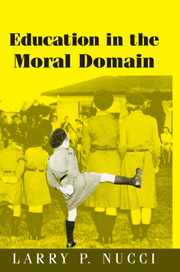Book contents
- Frontmatter
- Contents
- Foreword by Elliot Turiel
- Acknowledgments
- Introduction
- PART ONE THE NATURE OF MORALITY AND THE DEVELOPMENT OF SOCIAL VALUES
- 1 Morality and Domains of Social Knowledge
- 2 Morality and Religious Rules
- 3 Morality and the Personal Domain
- 4 Morality in Context: Issues of Development
- 5 Morality in Context: Issues of Culture
- 6 Morality and Emotion
- 7 Reconceptualizing Moral Character
- PART TWO CLASSROOM APPLICATIONS
- Conclusion: Keeping Things in Perspective
- Additional Resources
- References
- Index of Names
- Index of Subjects
5 - Morality in Context: Issues of Culture
Published online by Cambridge University Press: 12 November 2009
- Frontmatter
- Contents
- Foreword by Elliot Turiel
- Acknowledgments
- Introduction
- PART ONE THE NATURE OF MORALITY AND THE DEVELOPMENT OF SOCIAL VALUES
- 1 Morality and Domains of Social Knowledge
- 2 Morality and Religious Rules
- 3 Morality and the Personal Domain
- 4 Morality in Context: Issues of Development
- 5 Morality in Context: Issues of Culture
- 6 Morality and Emotion
- 7 Reconceptualizing Moral Character
- PART TWO CLASSROOM APPLICATIONS
- Conclusion: Keeping Things in Perspective
- Additional Resources
- References
- Index of Names
- Index of Subjects
Summary
As we saw in Chapter 4, people at any given level of development may read the moral and nonmoral components of complex social situations in different ways. One of the primary influences upon the ways in which people read social situations is the cultural frame in which they live. In their simplest form, these cultural influences result from the mere presence or absence of particular nonmoral rules or norms. For example, queuing in line to buy movie tickets can have moral implications only in a cultural setting where the convention of standing in line is in effect. Of more interest, however, is the manner in which cultures emphasize the importance of maintaining the existing social order, and the degree to which that social order emphasizes hierarchy and social stratification. Cultures, like individuals, are complex and multifaceted, and it is simplistic and even stereotypic to characterize cultures in global terms.
The discussion that follows begins with an examination of some general trends that can be observed emerging from the relative emphasis on tradition and hierarchy in cultural value systems. It moves on toward a discussion of how the heterogeneous nature of culture may lead to conflicting and even oppositional viewpoints in value orientations within a given society.
cultural emphasis on tradition
With regard to the first point in the discussion, it is the case that all cultural groups endeavor to maintain their traditions and customs and pass them on to the next generation. Without such conservative tendencies, the very existence of culture and society would be hard to envision. Cultures differ, however, in the degree to which adherence to custom and tradition is emphasized.
- Type
- Chapter
- Information
- Education in the Moral Domain , pp. 94 - 106Publisher: Cambridge University PressPrint publication year: 2001



